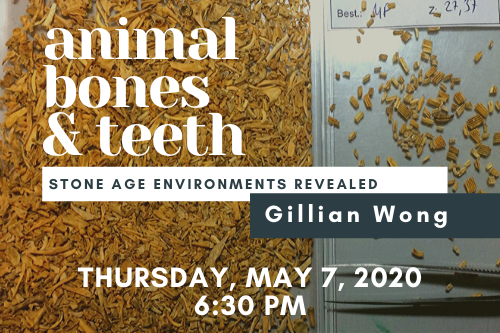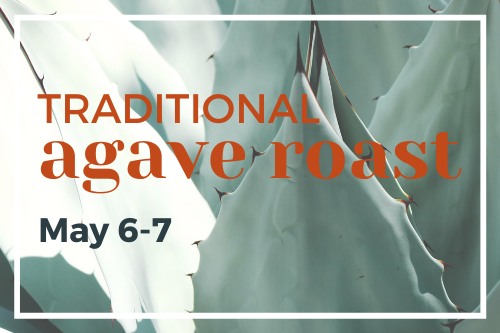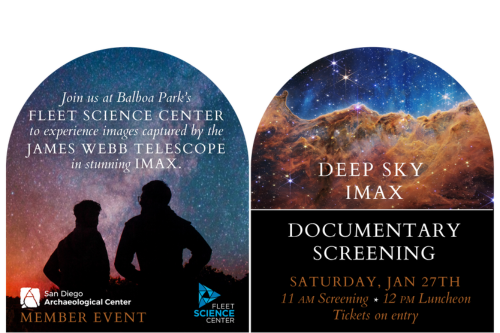A Life in San Diego Archaeology
San Diego Archaeological Center 16666 San Pasqual Rd., Escondido, CA, United StatesJoin the Center for a reception and presentation by local archaeologist, professor, and author Dr. G.Timothy Gross. Gross volunteered on his first archaeological projects as a high school student in 1968, and although he has worked outside San Diego, he has been involved in local archaeology ever since. In this talk he will reflect on the changes that have happened in the last 50 years in how archaeology has been done and by whom. He will look at what we have learned and what ideas we have discarded, and he will address the ever-changing political climate of local archaeology. A tour of the Center will be offered following the presentation. Date: Saturday, November 9, 2019 Time: 12 PM to 3 PM (Presentation at 1 PM) Location: San Diego Archaeological Center Cost: Free
Shrouded Heritage
San Diego Archaeological Center 16666 San Pasqual Rd., Escondido, CA, United StatesTen years ago, Thomas Holm read Scott O’Dell’s novel Island of the Blue Dolphins with his fourth-grade daughter. That experience led to him to research California’s indigenous mariners, including the “Nicoleño” of San Nicolas Island, which is the real setting of O’Dell’s book. That ten year journey, from elementary school field trip, to claims of improprieties, to the enactment of new preservation laws, will be addressed by Holm as he presents his new book entitled, Shrouded Heritage: Island of the Blue Dolphins. Holm sets out to learn the truth about California’s ancient island-dwelling People, especially the real-life woman fictionalized as Karana in Scott O’Dell’s beloved novel Island of the Blue Dolphins. That endearing soul became the last of her kind after witnessing the bloody massacre of her tribe. She then suffered 18 years of isolation on her cold and merciless island. This investigation of her life and the legacy of her People inadvertently triggers a battle among academics and Indigenous Peoples with world-wide implications. Woven together within this saga are data from church records, court papers, ship logs, and dozens of other historic and “scientific” documents. Likewise, and with equal reverence, included are oral accounts, traditional songs, and religious beliefs of tribal elders. This uniquely inclusive approach provides the source of new information about the real “Island of the Blue Dolphins” and its remarkable heritage. Also included in Holm’s presentation will be exclusive photos of unique artifacts, archeological excavations and extraordinary scenery from San Nicolas Island. About the Author Thomas Holm is an author, archaeological researcher, environmental activist, and long-distance paddler. His research has focused on the ancient maritime cultures of the Southern California Bight, including those of the Channel Islands. He teaches Marine Archaeology and Preservation at California State University, San Marcos and has made numerous solo passages on a stand up paddleboard from the mainland to the Channel Islands to research early oceanic trade routes. Signed copies of Holm’s book will be available for purchase and proceeds will help establish the M/V Conception Memorial Garden on Santa Cruz Island to honor 34 people recently killed during a boat fire. Date: Saturday, February 8, 2020 Time: 11 AM Location: San Diego Archaeological Center Cost: $2 (museum admission included; pay at door); Members Free
Animal Bones and Teeth
San Diego Archaeological Center 16666 San Pasqual Rd., Escondido, CA, United StatesZooarchaeologists seek to answer questions about the human past using animal remains from the archaeological record. These researchers explore what people ate, what environments were like, the movements of animals across landscapes, relationships between people and animals, and more. In this talk Gillian Wong will dive into what it means to be a zooarchaeologist and how animal remains can be used to address several key questions in our understanding of the human past. She will draw specifically from her PhD work that uses the remains of micro-mammals, like rodents and insectivores, from Langmahdhalde, an archaeological site in southwestern Germany, to reconstruct climates and environments during the stone age. What kind of vegetation existed during this time and how cold was it? But more importantly, what implications does all this have for human settlement of the region? About the Presenter Gillian Wong is a PhD student in archaeology at the University of Tuebingen in Germany. Her specialty is zooarchaeology, or animal (faunal) remains in the archaeological record. She is primarily interested in using animal remains to explore how large-scale changes in climate affected prehistoric hunter-gatherers at the local level. Currently, she is the zooarchaeologist for a project in southwestern Germany that is excavating one of the first Magdalenian (~15,000 years before present) sites to be discovered in the region since the 1970s. She has a Bachelor’s degree in Anthropology from the University of California, Davis and a Master’s degree in Anthropology from the University of Utah. When she’s not doing archaeology, Gillian enjoys hiking with her dog and husband, swimming, and reading. Date: Thursday, May 7, 2020 Time: 6:30 - 8 PM Location: San Diego Archaeological Center Cost: Included with paid museum admission ($2); Members Free
Agave Roast
Center Members are invited to join Stan Rodriguez (Kumeyaay – Iipay, Santa Ysabel) at the La Posta Indian Reservation for a traditional Agave Roast. Friday, May 6, 10 AM to 1 PM: Watch how the pit oven is prepared and agave hearts are made ready for roasting. Saturday, May 7, 1 to 5 PM: Enjoy Bird Singing and a pit roasting demonstration as well as taste and learn about the many uses of the agave plant. Other native food provided by Grey Wolf Monitoring. Thank you to La Posta Band of Mission Indians, Stan Rodriguez, Ed Mercado (Campo Kumeyaay Nation), Grey Wolf Monitoring, and Brian Williams of ASM Affiliates for making this event possible. This event is open to SDAC members. Not a member or need to renew? Purchase Membership Advance registration is required. You may attend one or both days and will receive directions prior to the event. Date: Friday, May 6, 2022 & Saturday, May 7, 2022 Time: 10 AM to 1 PM (Fri) & 1 PM to 5 PM (Sat) Location: La Posta Indian Reservation Cost: Free
Members Only: Visit to IVDM
Imperial Valley Desert Museum 11 Frontage Road, Ocotillo, CA, United StatesSDAC Members, join us for an open house, behind-the-scenes tour, and reception at the Imperial Valley Desert Museum. Members are invited to go behind the scenes with IVDM Staff to learn about their exhibits, curation and collection spaces encompassing 10 million years of regional and local history! Following morning tours, SDAC Members are welcome to join IVDM Executive Director Kristin O'Lear and SDAC Executive Director Stephanie Sandoval for wine and hors d'oeurves. Under IVDM's awning overlooking the beautiful Yuha Desert, they will discuss their organizations' mission, current work, and future projects! Please note: This event is open to current SDAC members only. If your membership has lapsed, you will be asked to renew in order to attend the event. Date: Saturday, October 14, 2023 Times: Museum Open House - 10 AM to 2 PM Behind-the-Scenes Tour - 10:30 AM & 11:30 AM Reception with Museum Directors - 12:30 PM Location: Imperial Valley Desert Museum 11 Frontage Road, Ocotillo, CA 92259 Cost: Free About the Imperial Valley Desert Museum The Imperial Valley Desert Museum is a new facility in the heart of the Yuha Desert housing Indigenous and historic artifacts found within the Imperial Valley and surrounding region. Opening a new museum in the twenty-first century, we do not want to be seen as an exhibit within four walls, but to engage and interact outside of the limitations of the "box" – both metaphorically and physically.
Members Only: Deep Sky IMAX Screening
Fleet Science Center 1875 El Prado, San Diego, CA, United StatesSDAC Members are invited to visit Balboa Park’s Fleet Science Center for a free screening of their Deep Sky IMAX documentary on the James Webb Telescope and its discoveries. Join us afterwards for a luncheon to meet other members, discuss the telescope incredible images, and wonder at recent advances in the sciences. Date: Saturday, January 27, 2024 Time: 11 AM to 1 PM (Film Screening: 11 AM; Lunch: 12 PM) Location: Fleet Science Center Cost: Free About the Fleet Science Center The Fleet Science Center is on a mission to realize a San Diego where everyone is connected by the power of science to create a better future. They are a community-focused countywide organization that collaborates with educators, scientific organizations, community leaders and champions of a-ha moments.


